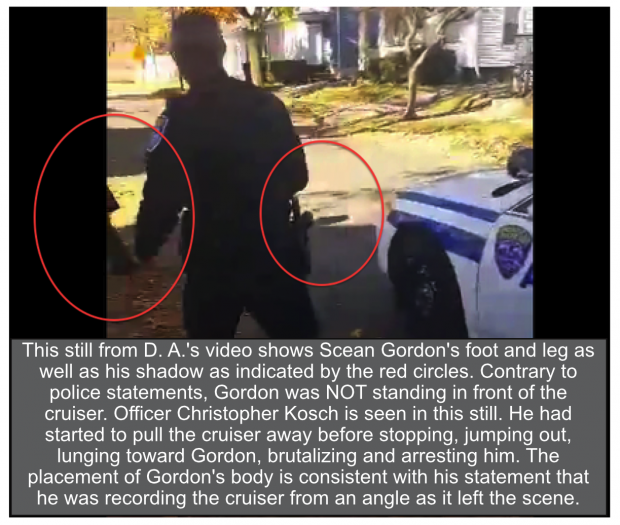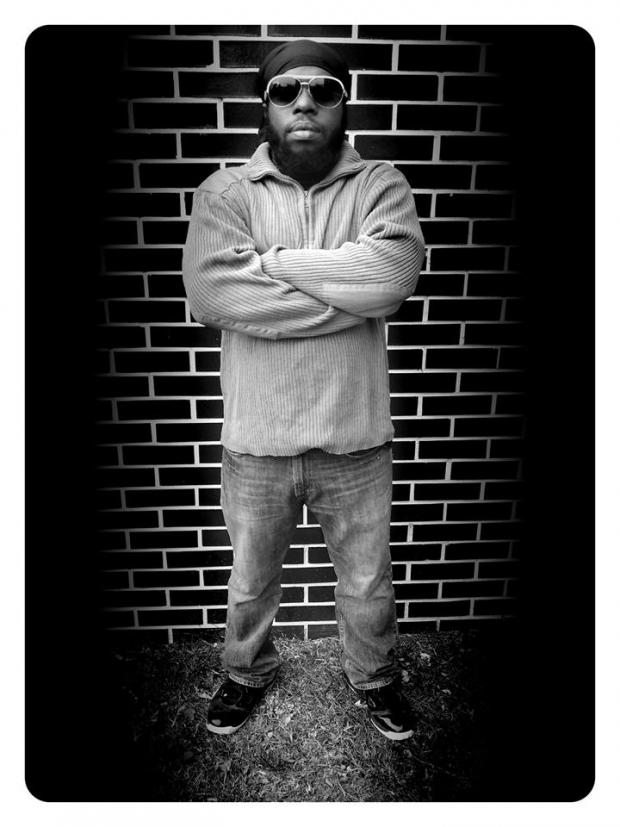Gordon's motions denied by judge in police violence case
Primary tabs
Scean Gordon, represented by Assistant Public Defender Christine Seppeler, stood tall wearing his Black Panther t-shirt and navy blue button down as city court Judge Ellen Yacknin hemmed and hawed while she considered each of Ms. Seppeler's well-argued motions before denying each. The January 5, 2016 hearing was a last attempt for Mr. Gordon to take a plea deal before trial preparations commenced. Seven supporters of Mr. Gordon sat in court.
Mr. Gordon was brutalized and arrested by Rochester Police Department officers Nicholas Thomas and Christopher Kosch after video taping them mis-identifying and arresting his neighbor Daryl Appleberry on November 9, 2015. Mr. Gordon pulled out his cell phone and started recording the scene immediately after police said that his neighbor was under arrest. Officers at the scene were uncooperative with Mr. Gordon's questions as he tried to identify them. He was able to record some of their name plates, badge numbers, and car numbers. He told Mr. Appleberry to remain silent and maintain his rights.
As the cruiser was pulling away to the right with Mr. Appleberry in handcuffs in the back seat, officer Thomas stopped the vehicle—telling his partner officer Kosch “I have to get this guy for something [referring to Mr. Gordon],” according to Mr. Appleberry. Officer Thomas jumped out of the cruiser, told Mr. Gordon he was under arrest, and proceeded to tackle him, threw him into the pavement, used a Taser on him, pepper sprayed and choked him. Mr. Gordon was eventually handcuffed and put into the back seat of a different cruiser and taken away.
Mr. Appleberry was released shortly after Mr. Gordon was removed from the scene. When Mr. Appleberry asked to see the photo of the suspect, the officers remained silent. An unknown officer said, “Oh, you all look alike,” according to Mr. Appleberry.
Ms. Seppeler laid out a strong defense of her client. She entered motions to dismiss the disorderly conduct and obstruction of governmental administration charges arguing that there was “insufficient” evidence for the charges to stand. She also entered a motion to dismiss the charges in the furtherance of justice after reviewing two videos of the incident in question. Her final motion asked the court to grant a jury of Mr. Gordon's peers from within the boundaries of the City of Rochester rather than Monroe County.
With regard to the first motion, Ms. Seppeler questioned the allegations stating that Mr. Gordon had blocked traffic. She said the allegations were “not serious interferences with traffic.” She also said that part of the disorderly conduct statute required an indication of public inconvenience. The allegations in the arrest report gave no indication of inconvenience.
Grafton Street, where Mr. Gordon was arrested, is a quiet, residential street off of Portland Avenue and not a heavily trafficked road.
The assistant district attorney simply re-stated the police report saying that it, “indicates that he prevented a police car from leaving and that he caused another car to stop. He was told several times to get out of the street.”
Judge Yacknin agreed with the prosecutor and stated that the law allows for the charge to stand. “I'm denying the motion to dismiss because the people say [Mr. Gordon] was alleged to have run away in addition to the OGA—standing in front a police car.”
Ms. Seppeler then agued the motion to dismiss the OGA based on a lack of evidence showing that Mr. Gordon had physically interfered with the arrest of Mr. Appleberry. Mr. Gordon would have had to have had physical contact with the officers while they conducted their investigation for an OGA charge to stick. She also requested to know specifically—as the OGA charge is a vaguely written laundry list of things one can be charged with—what government function her client was alleged to have interfered with.
The judge denied this motion stating that Mr. Gordon was alleged to have blocked a police car from leaving the scene, which constituted physical contact. Stills from the video taken at the scene clearly show Mr. Gordon in a driveway near the curb as the police vehicle operated by officer Thomas started to pull away and then stop.
[Mr. Gordon and Mr. Appleberry have recently stated that it was officer Nicholas Thomas who was driving, not officer Kosch.]
At this point, the judge noted that Mr. Gordon had refused the plea deal offered to him on December 7, 2015: four work weekends at the jail and a guilty plea to a misdemeanor.
Judge Yacknin asked Mr. Gordon if he would accept the previous offer with a reduction in the number of work weekends: three work weekends rather than four and a plea of guilty to a misdemeanor. Mr. Gordon, once again, refused the offer.
Ms. Seppeler then argued her second motion: dismiss the charges in the furtherance of justice. She argued that “one of the most compelling factors [for dismissal] is the public's confidence in the criminal justice system.”
She explained that there was were two videos of the incident—perhaps 10 minutes total—and asked the court to review the videos before making a decision on whether to grant or deny the motion to dismiss in the furtherance of justice. Based on that video evidence, by not dismissing the charges, the public's confidence in the criminal justice system would be shaken.
“There was some misconduct on the part of the police and some excessive force used on Mr. Gordon,” said Ms. Seppeler.
Judge Yacknin asked if there were any cases Ms. Seppeler could cite that would tell a judge to review video evidence in determining whether or not charges should be dismissed in the furtherance of justice.
“Judges are to look at words and documents [referring to the police reports], not video,” said the judge. Judge Yacknin stated that looking at the video would put her in a position of acting as a jury instead of allowing a jury to review the video evidence so that they could make their own determination about what happened.
The judge, during this exchange, looked toward Mr. Gordon and said, “I'm not saying what the police allege is true. According to the report, your conduct at the scene was evocative—not that of an upstanding citizen.” She continued, “That's what the allegations were—you do have a criminal history and perhaps there was misconduct on the part of the law enforcement officers.”
Regarding the video evidence and the motion to dismiss, the judge said, “A jury will have to take this into consideration. In any event, I'm going to deny the motion to dismiss in the furtherance of justice.”
Ms. Seppeler stated that while she didn't have specific case law that told judges to review video evidence from the scene, she did cite People v. Clayton which grants for an evidentiary hearing to determine whether “the dismissal would in fact be in the 'interests of justice',” according to Wikipedia.org.
Judge Yacknin affirmed her previous decision and denied the motion.
Ms. Seppeler's last motion was, that in the event of a trial, all the members of the jury be pooled from the City of Rochester rather than Monroe County. The subtext of this motion, from an observer's position, was that Mr. Gordon was worried about having a fair trial—one where he would be judged by a jury of his peers (Black, low income, from the city) rather than by a jury comprised of mostly middle-class, white people who live outside of the city.
“There is a historical under-representation of [Black] city residents who appear on juries,” said Ms. Seppeler.
The assistant district attorney argued that the charges were not unique to city residents and asked the judge to reject the motion.
“I cannot grant the motion. The commissioner of jurors makes that call,” said Judge Yacknin.
The judge then cited IN RE: Sidney OGLESBY where a Syracuse city court judge ordered that a jury be pooled from the city. The judge's decision in that case was eventually overturned on appeal. Judge Yacknin followed precedent. (Read A Jury of One's Peers? by Charles A. Keller, III. Esq. for more information regarding the Syracuse case that Judge Yacknin cited.)
She continued by saying that there had been a “180 degree turn around in the last two years of city residents sitting on juries for city cases. The motion is denied.”
A Huntley Hearing was scheduled for Mr. Gordon's case on February 9 at 10:30am. All community support is welcome.
Enough is enough.
Related: Two Black men, one falsely arrested & the other brutalized by RPD, tell their stories | REMOVE THE CLOAK OF SECRECY! POLICE TRANSPARENCY NOW! | Civilian Review Board built to fail Benny Warr and other complainants | Your Friendly Neighborhood Police State -- a reading for EIE











